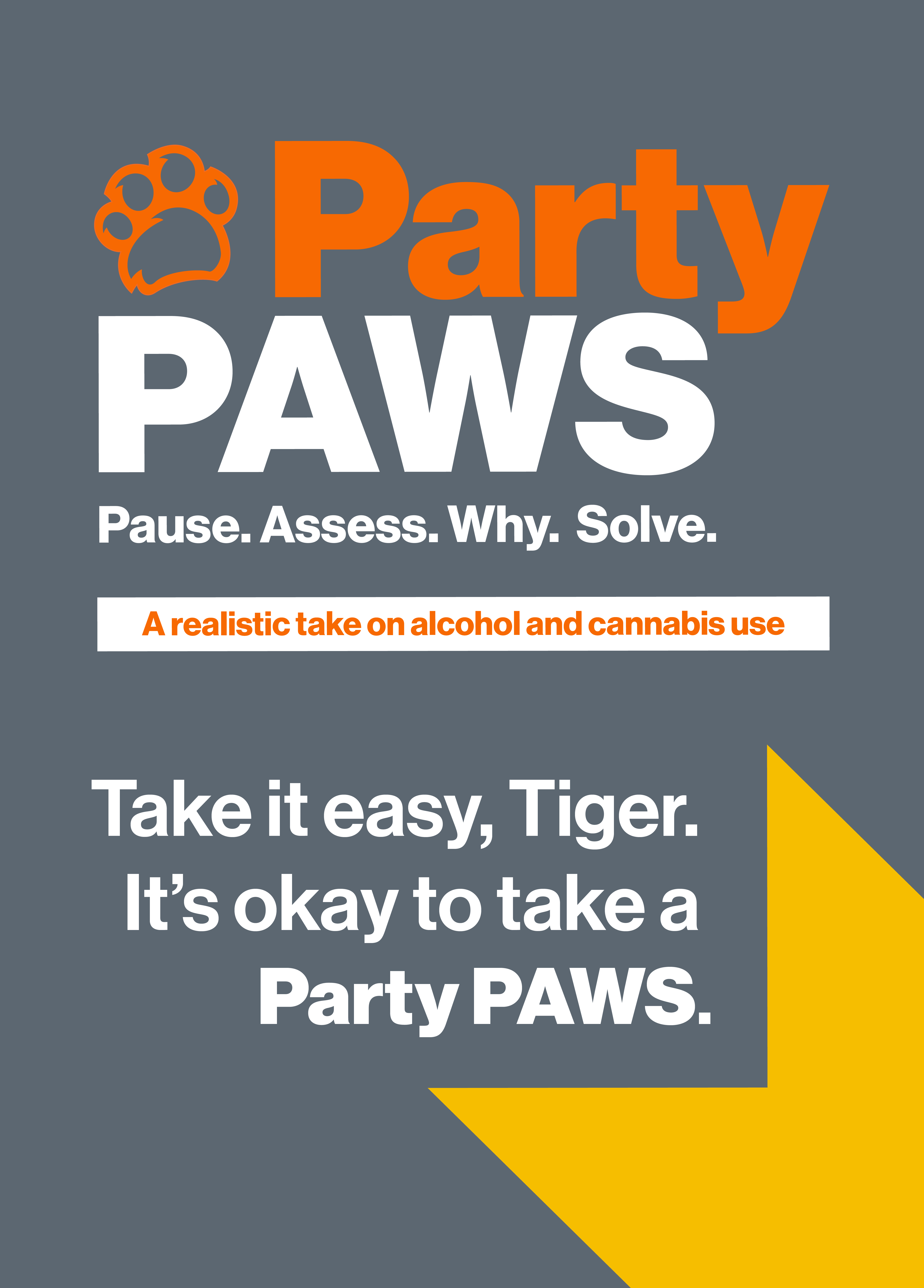Party PAWS
Pause. Assess. Why. Solve.
Rooted in harm reduction philosophy, all alcohol and cannabis educational programs provide an opportunity to explore research about these substances and what use looks like. When educating, we explore ways to consume safely and responsibly. The consumption of alcohol is prohibited by RIT Code of Conduct and against NYS law if you are under the age of 21. Additionally, cannabis is prohibited on campus, illegal at the federal level, and is also against the RIT Code of Conduct.
Our comprehensive approach to alcohol and cannabis prevention and intervention focuses on early introduction of education and skill-building through Party PAWS, introducing you to key information to help you identify practical strategies to reduce harm and seek help or resources when needed. Additionally, we strive to correct misperceptions that many students hold about college alcohol, cannabis, tobacco, and other drug use to reduce harmful consequences. Our goal is to support you in achieving your personal and academic potential.
Party PAWS Overview
Party PAWS is a realistic take on alcohol and cannabis use.
Party PAWS is a comprehensive education and awareness program created to help students of the RIT community better understand alcohol and cannabis use. We aim to share relatable and reliable education to help students make informed and responsible decisions if they choose to consume.

PAUSE to check in with yourself before consuming more.
ASSESS what’s happening - take some time to take it all in.
WHY are you choosing to have another? Don't mindlessly consume.
SOLVE for the situation. Make an informed decision about what to do next.
Responsible Consumption
A Standard Drink Size in the United States is equal to 14.0 grams (0.6 ounces) of pure alcohol. Usually, this amount of pure alcohol is found in:
- 12-ounces of beer (5% alcohol content)
- 8-ounces of malt liquor (7% alcohol content)
- 5-ounces of wine (12% alcohol content)
- 1.5-ounces or a “shot” of 80-proof (40% alcohol content) distilled spirits or liquor (e.g., gin, rum, vodka, whiskey)
If you choose to consume alcohol, consider utilizing the harm reduction strategies below:
- Drink water and lots of it
- Eat before or during consumption
- Know your limits and stick to them
- Pace yourself - it takes your body about 20 minutes to feel one drink and on average one hour to process the drink through your system
- Space out your drinks with non-alcoholic drinks
- Never mix alcohol and prescription drugs or other drugs (even caffeine)
- Measure your drinks
If you choose to consume cannabis, consider utilizing the harm reduction strategies below:
- Drink water
- Pace yourself
- Eat before or during consumption
- Use with people you know
- Plan for a safe way home
- Be in a familiar environment
Edibles can usually take anywhere from 30 minutes to two hours to feel the effects, depending on how potent the edible is (how much THC is in it).
- Drink water
- Pace yourself
- Eat before or during consumption
- Use with people you know
- Plan for a safe way home
- Be in a familiar environment
Party Goer & Thrower Checklists
Are you considering going to a party this weekend? Or maybe hosting a party or having a few friends over? Check out the checklists below to make sure you keep yourself and everyone around you safe and having a good time.
Party Goer Checklist
Considering attending a party? Here are some tips before heading out the door!
- Decide if you’re going to drink before the party to help plan the rest of the night.
- If you plan to drink, plan how much and what type of alcohol you plan to consume.
- Before drinking, plan how you’ll get to and home from the party.
- Eat before or during the party.
- Drink water throughout the night.
- Slow down and wait at least 20 minutes in between alcoholic beverages.
- Stay with the same group of friends throughout the night.
- Know the address of the party and share it with a friend so they know where you are.
Party Thrower Checklist
Considering hosting a party or having a few friends over? Here are some tips to help keep everyone safe and having a good time!
- Don’t serve alcohol to minors (anyone under 21).
- Have non-alcoholic beverages available for non-drinkers and for consumption between alcoholic options.
- If you are the host and decide to drink, make sure someone else at the party is sober to help co-host. They can help manage the group and ensure that everyone is acting responsibly.
- Invite only the amount of people that your residence allows. Don’t overflow.
- Invite people you know personally. Turn away anyone who is visibly intoxicated. It’s your party, and if a Resident Assistant, Public Safety, or a Police Officer shows up, you’re responsible for whoever is present.
- Lock doors to any rooms or spaces you don’t want guests accessing.
- Give your neighbors a heads-up before throwing your party. It’s courteous, and if they have any complaints, they’ll be more inclined to talk to you first before calling the police.
- Have food! Drinking on an empty stomach is never a good idea (plus, having snacks makes people happy)!
- Do not hesitate to call Public Safety or 911 if you feel someone at the party needs medical attention, has consumed too much, or their behavior is getting out of hand.
CBD vs. THC
Cannabidiol (CBD) and tetrahydrocannabinol (THC) are two natural compounds found in plants of the Cannabis genus.
CBD doesn’t produce the high associated with THC. Some CBD oils do contain small traces of THC. CBD can have no more than 0.3 percent THC to be legal at the federal level. THC produces a high or sense of euphoria.
Alcohol, Cannabis and Your Health
Choosing to consume cannabis before sleep can interfere with the quality of your sleep. If you are using a substance to assist with sleep, you should consult your doctor for more information and specifics related to your unique health situation.
Current research surrounding cannabis as a sleep aid yields mixed results. Most research is preliminary and further investigation is necessary to determine valid health improvement claims as they relate to cannabis use.
For more information on other areas of your health that cannabis impacts, visit CDC.gov.
Choosing to consume alcohol before sleep can interfere with the quality of your sleep. If you are using a substance to assist with sleep, you should consult your doctor for more information and specifics related to your unique health situation.
While it may feel like alcohol helps you fall asleep quickly, it significantly disrupts the quality of sleep during the second part of the night. Studies show that consuming alcohol before sleep is more likely to reduce rapid eye movement (REM). Disruptions in REM sleep may cause daytime drowsiness, poor concentration, poor attention span, and a decrease in overall hours slept. Research indicates that the more you drink before bed the more pronounced the effects on REM may be.
Visit the following resources for more information about alcohol and sleep:
Alcohol, Cannabis and Impaired Driving
Consuming alcohol or cannabis and choosing to drive poses risks and potentially death to everyone on the road. Alcohol and cannabis affect the body in many ways, listed below are ways these substances can have direct impacts on skills needed for driving safely.
Effects on driving under the influence include, but are not limited to:
- Reduced coordination
- Impaired perception
- Impairment of peripheral vision
- Reduced ability to track moving objects
- Reduced response to emergency driving situations
- Lack of concentration
- Short-term memory loss
- Reduced information processing capability (e.g., signal detection, visual search)
- Reduced ability to maintain lane position and brake appropriately
- Substantial impairment in vehicle control, attention to driving task, and in necessary visual and auditory information processing
Click here for more information on driving while impaired.
Good Samaritan Protocol
Student health and safety are a primary concern for the university community. Students are expected to contact Public Safety when it is believed an individual needs medical attention due to the abuse of alcohol or other drugs including prescription, over-the-counter, or other.
The Good Samaritan Protocol is designed to provide education rather than discipline when a student voluntarily contacts university personnel (e.g., Public Safety, Resident Advisor) or outside emergency services for medical assistance related to alcohol or other drugs.
Individuals covered by the Good Samaritan Protocol are the caller, the person in need of assistance, the host Student organization, and any witnesses named in the incident report.
Click here for more information on the Good Samaritan Protocol.
Alcohol poisoning is a medical emergency. If you or someone you know is experiencing one of any of the following, seek help immediately.
Signs and symptoms:
This is not a checklist. If someone is experiencing one or any of the following, call for help immediately.
- Vomiting (if the person is vomiting, turn them on their side to prevent choking)
- Passing Out
- Seizures
- Irregular breathing
- Pale Skin
- Confusion
Who to call:
- If you are on campus, contact your Resident Assistant or Public Safety by calling 585-475-3333 or texting 585-205-8333
- If you are off-campus, call 911
After you call for help, stay with the person until help arrives. If the person is vomiting, turn them on their side to prevent choking.
THC poisoning is a medical emergency. We are still learning about what THC poisoning can look like and its effects on the body. If you or someone you know is experiencing one of any of the following, seek help immediately.
Signs and symptoms:
- Extreme confusion
- Severe nausea or vomiting (if the person is vomiting, turn them on their side to prevent choking)
- Anxiety
- Paranoia
- Panic
- Fast heart rate
- Delusions or hallucinations
- Increased blood pressure
In some cases, these reactions can lead to unintentional injuries such as a motor vehicle crash, fall, or poisoning.
Who to call:
- If you are on campus, contact your Resident Assistant or Public Safety by calling 585-475-3333 or texting 585-205-8333
- If you are off-campus, call 911
After you call for help, stay with the person until help arrives. If the person is vomiting, turn them on their side to prevent choking.

